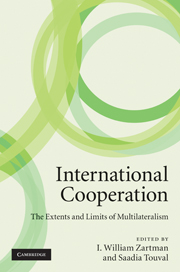Book contents
- Frontmatter
- Contents
- List of figures
- List of tables
- List of contributors
- Acknowledgements
- 1 Introduction: return to the theories of cooperation
- Part 1 Multilateral meanings of cooperation
- Part 2 Multiple strategies of cooperation
- 6 Synthesizing rationalist and constructivist perspectives on negotiated cooperation
- 7 The shadow of the past over conflict and cooperation
- 8 Chicken dilemmas: crossing the road to cooperation
- 9 Conflict management as cooperation
- 10 Status concerns and multilateral cooperation
- 11 Asymmetrical cooperation in economic assistance
- 12 Conclusion: improving knowledge of cooperation
- Bibliography
- Index
8 - Chicken dilemmas: crossing the road to cooperation
Published online by Cambridge University Press: 05 June 2012
- Frontmatter
- Contents
- List of figures
- List of tables
- List of contributors
- Acknowledgements
- 1 Introduction: return to the theories of cooperation
- Part 1 Multilateral meanings of cooperation
- Part 2 Multiple strategies of cooperation
- 6 Synthesizing rationalist and constructivist perspectives on negotiated cooperation
- 7 The shadow of the past over conflict and cooperation
- 8 Chicken dilemmas: crossing the road to cooperation
- 9 Conflict management as cooperation
- 10 Status concerns and multilateral cooperation
- 11 Asymmetrical cooperation in economic assistance
- 12 Conclusion: improving knowledge of cooperation
- Bibliography
- Index
Summary
The metaphor of “playing chicken” recurs in both public and policy-elite discussions of international relations (IR). For example, the metaphor was used by The New Republic, Newsweek, and Time to describe the Soviet Union's pressure on independence-minded Lithuania in 1990, the standoff between Iraqi officials and UN inspectors in 1991, and the US confrontation with North Korea over nuclear weapons in 1994, respectively. In IR scholarship, Chicken has been invoked to describe the 1962 Cuban missile crisis, in which failure to reach agreement could potentially have led to nuclear war (Brams 1975, pp. 39–47; Brams 1985, pp. 48–62), although the preference orderings in that crisis may not actually have conformed with Chicken (see Brams 1994, 130–38; Langlois 1991). Schwartzman (1988) uses the chicken metaphor in discussing Cold War nuclear policies, and humorist Dave Barry (1984) once evocatively described the Cold War as “258 crucial world hotspots, where at this moment the United States and the Soviet Union, each with one hand on the steering wheel and the other on the horn, are simultaneously edging into the same parking space …”
The chicken metaphor has not, however, played much of a role in the development of IR theory. Rather, mainstream IR theory in the 1980s and the 1990s – specifically neoliberal institutionalism – revolved around the formal model of iterated Prisoner's Dilemma (PD). Keohane's (1984) extremely influential After Hegemony exemplifies the approach (see also Oye 1986a; Baldwin 1993).
- Type
- Chapter
- Information
- International CooperationThe Extents and Limits of Multilateralism, pp. 135 - 160Publisher: Cambridge University PressPrint publication year: 2010



